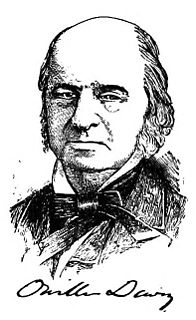A Quote by Orville Dewey
We may neglect the wrongs which we receive, but be careful to rectify those which we are the cause of to others.
Related Quotes
God grant that each of us here today may so live that all among us, and with us, may see, not us, but that which is divine and comes from God. With that vision of what those who have lost their way may become, my prayer is that they may receive strength and resolution to climb higher and higher and upward and onward to that great goal of eternal life and also that I may do my part in seeking to show by example, as well as by precept, that which will be the best of which I am capable of doing.
It is not uncommon for those who at their first entrance into the world were distinguished for attainments or abilities, to disappoint the hopes which they had raised, and to end in neglect and obscurity that life which they began in honour. To the long catalogue of the inconveniences of old age, which moral and satirical writers have so copiously displayed, may be often added the loss of fame.
There is an earthly sun, which is the cause of all heat, and all who are able to see may see the sun; and those who are blind and cannot see him may feel his heat. There is an Eternal Sun, which is the source of all wisdom, and those whose spiritual senses have awakened to life will see that sun and be conscious of His existence; but those who have not attained spiritual consciousness may yet feel His power by an inner faculty which is called Intuition.
Life is challenging. I wish I could tell you that you’ll always be on top of the mountain, but the reality is that there are days when nothing will go right, when not only will you not be on top, you may not even be able to figure out which way is up. Do yourself a favor, and don’t make it any harder than it has to be. In those moments, be careful how you speak to yourself; be careful how you think of yourself; be careful how you conduct yourself; be careful how you develop yourself.
Nothing is more unjust, however common, than to charge with hypocrisy him that expresses zeal for those virtues which he neglects to practice; since he may be sincerely convinced of the advantages of conquering his passions without having yet obtained the victory as a man may be confident of the advantages of a voyage or a journey, without having courage or industry to undertake it, and may honestly recommend to others those attempts which he neglects himself.
Social progress means a checking of the cosmic process at every step and the substitution for it of another, which may be called the ethical process; the end of which is not the survival of those who may happen to be the fittest, in respect of the whole of the conditions which obtain, but of those who are ethically the best.
I imagine that thinking is the great desideratum of the present age; and the cause of whatever is done amiss may justly be reckoned the general neglect of education in those who need it most, the people of fashion. What can be expected where those who have the most influence have the least sense, and those who are sure to be followed set the worst examples?
This is what writers mean when they say that the notion of cause involves the idea of necessity. If there be any meaning which confessedly belongs to the term necessity, it is unconditionalness. That which is necessary, that which must be, means that which will be, whatever supposition we may make in regard to all other things.
































